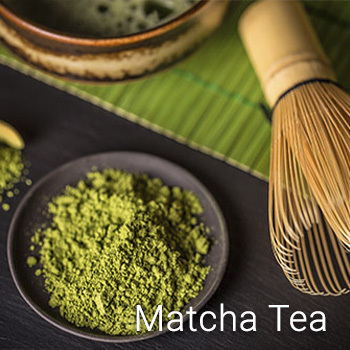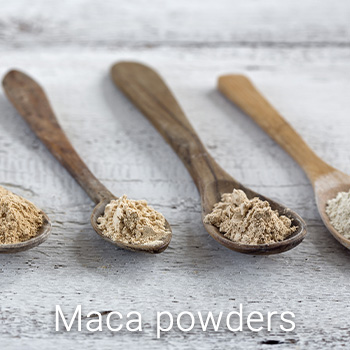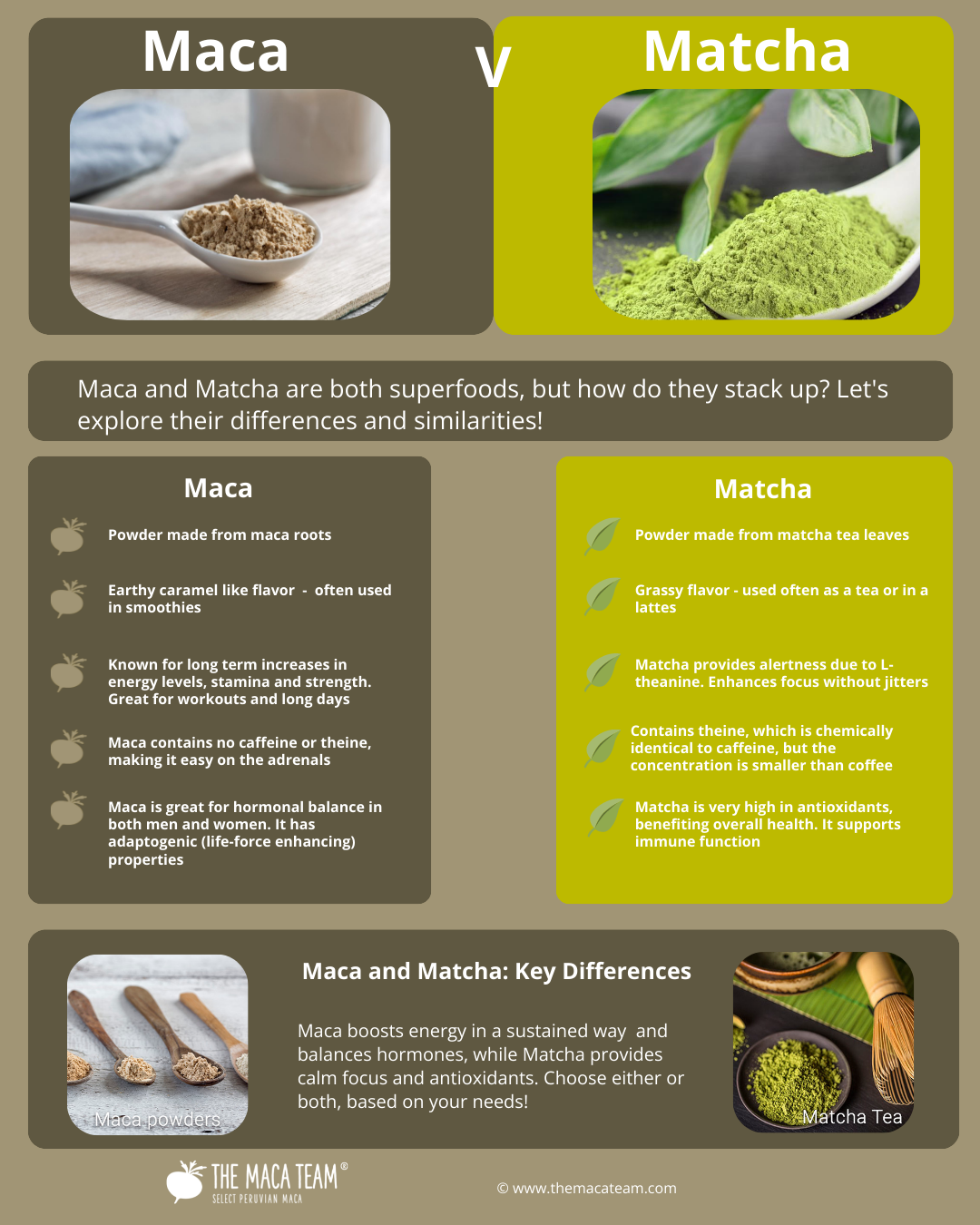Which is Better, Matcha or Maca?
Posted by The Maca Team on 2nd Jan 2020
Maca vs. Matcha: What's The Difference?
With two similar sounding names, these superfoods can be easily confused. They both gently encourage health and wellness in the body. However, the tea and the root vegetable offer different ways to support overall health
Which is better maca or matcha? That's a good question and the answer depends on what you are looking for from adding either of these two superfoods to your life. Read on to learn the difference between matcha and maca.

Matcha Powder
While regular green tea discards its green tea leaves after a three-to-five-minute steep, matcha includes the leaves within its stone-ground powder. Matcha tea and regular tea come from the same plant and both have a nice green color.
However, matcha is steamed, de-stemmed, de-veined and ground into powder. The bright green powder mixes directly into the liquid and blends into the tea permanently. That means you don't have to remove any type of tea bag as you would with a standard green tea.
With more of the tea leaf embedded into the tea, matcha contains 20 times more antioxidants, amino acids and nutrients than the classic green tea bag. For these reasons drinking matcha offers more of an energy boost than regular green tea.
Matcha contains theine, which is chemically identical to caffeine, but the concentration is much smaller than a normal

cup of coffee. One cup of matcha tea usually contains about 38-54mg of caffeine, while an 8 oz cup of coffee averages 95mg. The caffeine in matcha also binds with several different nutrients in the body to produce a steady boost of energy that lasts up to six hours, sans the jittery, too-much-coffee feeling. The powerful tea also contains the amino acid, L-theanine, which combines with the caffeine to promote an alert, yet calm, awareness.
As far as flavor profile goes, matcha’s fine powder tastes somewhat bitter, but leaves a slightly sweet aftertaste. Many matcha tea drinkers prefer to mix it with hot water or whisk it together with milk for a hot latte-like experience. But this versatile green powder also mixes well with smoothies, soups, yogurt, granola and chocolate.
Maca Powder
Unlike Matcha, Maca is a root vegetable, something like a turnip or beet, that is most commonly ground into powder for human consumption. It grows in the central Peru at 11,000 feet elevation and above. The cold, wind and elevation prevent any pests or weeds from tainting the root’s purity or nutritional benefits. Unlike matcha, the root vegetable is caffeine free.
This tuber also has a high nutritional profile of vitamins and minerals. With 19 essential amino acids, vitamins A, B1, B2, B3, C and D, iron, magnesium, copper, zinc, sodium, potassium and calcium, maca proactively assists the body’s central nervous system in times of stress instead of spiking then taxing the body’s cortisol levels, like caffeine does. Maca may also support hormone balance, fertility and increased sexual function in both men and women.
Maca is an adaptogen. Like its name implies, adaptogens help the body adapt to stress and combat overuse of its

fight-or-flight tendencies that lead to chronic fatigue, anxiety and depression. It can positively affect mood, stress, blood sugar levels and stamina throughout the day. By balancing energy levels in a natural way, maca helps regain daily rhythms and fills people with natural energy during the day as well as restful sleep throughout the night.
The flavor of maca powder tastes slightly earthy but leaves the tongue with notes of butterscotch or caramel. Popular ways to use maca powder include mixing it into smoothies, adding it to energy bars or oatmeal and using it to boost the nutrients in sauces and drizzles.
Which one to take?
Both of these nutritional powerhouses are associated with long-term health benefits, but not enough can be said about the importance of hormone health as well as balanced stress levels. If any of these are off, they can lead to a multitude of physical, emotional and psychological issues. For that reason, we'd give maca a slight edge over matcha when it comes to overall, consistent and sustained health.
Frequently Asked Questions About the Differences Between Maca and Matcha
-
Can maca and matcha be consumed together?
Yes absolutey! The combination of maca's adaptogenic qualities can complement matcha's quick energizing properites. This can offer sustained energy along with improved focus.
-
Are there any side effects associated with maca or matcha?
Matcha and maca generally considered safe for most people when consumed in moderation. While there are no known side effects directly associated with them, the theine in matcha can lead to insomnia or increased heart rate in some people. And maca, especially raw maca can cause temporary minor digestive issues for some people. If you have any doubts about adding either to your diet, please consult with a knowledgable health care practitioner.

Enjoy the day!
The Maca Team
Next Up - Find out Which Maca Is Right For You

